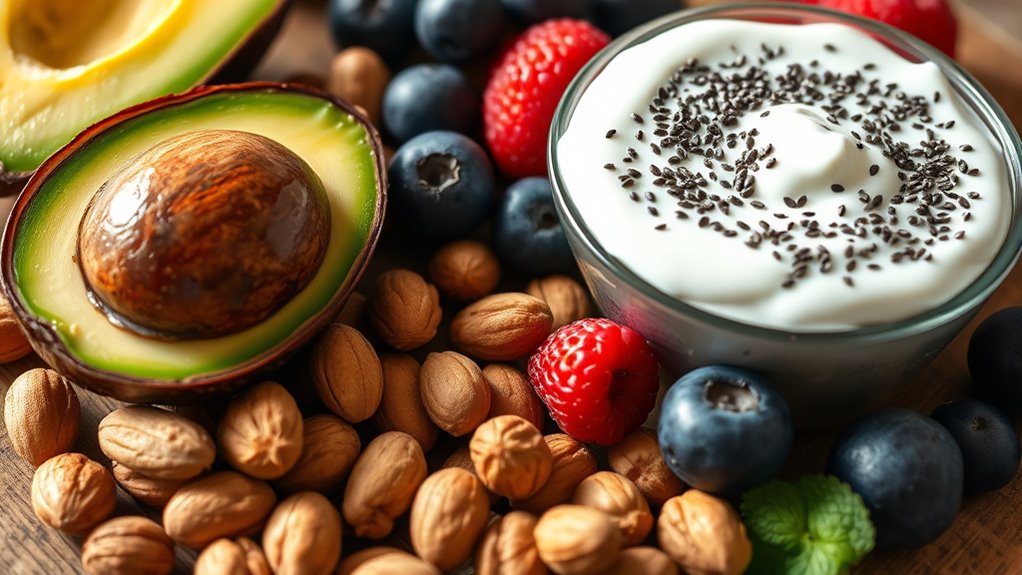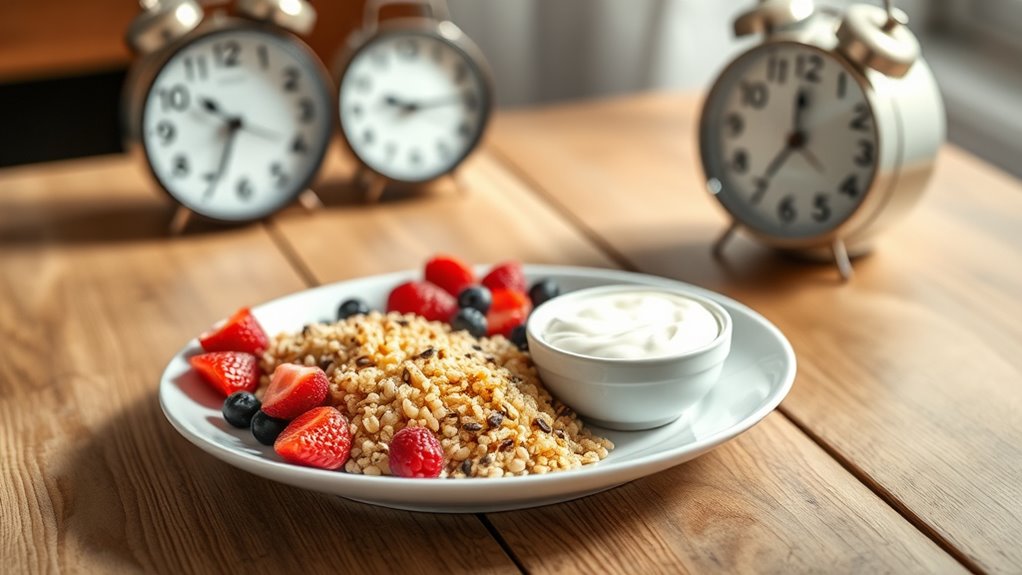Many nutrition myths can sabotage your weight loss efforts. Believing that calorie counting alone determines success ignores your body’s complex responses and food quality. Thinking low-fat diets are best may lead to unhealthy carb intake, while late-night eating and irregular meal timing can disrupt your metabolism and increase cravings. Plus, some assume processed foods are always bad or that all carbs are harmful. To improve your results, understanding these misconceptions can be game-changers—discover more facts that can transform your approach.
Key Takeaways
- Believing all processed foods are unhealthy ignores the benefits of nutrient-dense options and healthy fats.
- Focusing solely on calorie counting oversimplifies energy balance, ignoring hormones, food quality, and individual metabolism.
- Assuming low-fat diets lead to weight loss overlooks the importance of fat quality and balanced macronutrients.
- Thinking late-night eating causes inevitable weight gain neglects circadian rhythms and the timing of meals.
- Relying on extreme restrictions or fad diets undermines long-term sustainability and healthy lifestyle balance.
Misconceptions About Calorie Counting and Weight Loss

Many people believe that simply counting calories is the key to losing weight, but this approach often oversimplifies the complex process of energy balance. Calorie counting can be inaccurate because calorie calculators rely on averages, which don’t account for your unique metabolism and activity levels. You might underestimate your intake or overestimate your activity, leading to misjudged progress. Relying solely on calories can also foster unhealthy eating habits and diminish the enjoyment of food, affecting your relationship with eating. While calorie counting might produce short-term results, it rarely supports long-term weight maintenance due to the body’s adaptive responses. Remember, weight loss isn’t just about numbers; hormonal responses, metabolism, and food quality all play essential roles in your progress. Additionally, metabolic variability influences how your body responds to calorie deficits, making a one-size-fits-all approach ineffective for many individuals. Recognizing that individual differences significantly impact weight loss outcomes highlights the importance of personalized strategies beyond calorie tracking.
The Truth About Hydration and Water Intake Needs

Understanding your hydration needs is essential for effective weight management, as drinking enough water can influence appetite, metabolism, and exercise performance. Proper hydration helps suppress hunger, filling your stomach and reducing calorie intake. It also boosts metabolism by expanding cell volume and increasing lipolysis, aiding fat burning. Drinking 500 mL before meals can decrease energy intake by 13% and improve weight loss results. Remember, individual needs vary based on activity and environment. Avoid excessive water intake, which isn’t linked to faster weight loss but staying well-hydrated is vital. Maintaining proper hydration can also support air purifier performance, ensuring you breathe cleaner air that complements your health goals. Additionally, understanding content ownership rights is important as it impacts how health information is shared and utilized. Proper hydration can also help mitigate the effects of market volatility on your overall well-being by supporting consistent health routines.
Carbohydrates: Friend or Foe in Your Diet?

Not all carbohydrates are created equal, and your choices can substantially impact your health. Picking the right types—like whole grains and vegetables—helps manage blood sugar and supports weight loss. Understanding how to choose healthy options makes carbs your ally, not your foe. Incorporating foods rich in dietary fiber such as chia seeds can further enhance digestive health and aid in weight management. Additionally, creative practice can be a helpful tool in developing mindful eating habits and reducing cravings.
Types of Carbohydrates
Carbohydrates are an essential part of your diet, providing the energy your body needs to function. There are different types, each with unique roles. Starches, found in grains, potatoes, and legumes, are complex carbs that digest slowly, supplying sustained energy. Sugars, including natural ones in fruits and added sugars in processed foods, are simple carbs that digest quickly. Fiber, present in whole grains and vegetables, isn’t digested but supports digestive health and gut bacteria. Oligosaccharides, in beans and peas, are short sugar chains that aid digestion. Polysaccharides, like starch and cellulose, form long chains, offering structural support and energy. Understanding these types helps you make smarter carb choices, balancing quick energy with sustained fuel, and supporting overall health. Digestive health is further supported by the different roles these carbs play in your diet. Incorporating a variety of carbohydrate types can optimize your energy levels and improve nutrient absorption. Additionally, choosing whole grain options can enhance fiber intake and promote better digestion. Incorporating foods rich in resistant starch can also support gut microbiota and overall digestive wellness. Incorporating diverse carbohydrate sources can contribute to a healthier and more balanced diet.
Impact on Blood Sugar
The impact of carbohydrates on blood sugar levels plays a crucial role in your overall health and diet choices. Consuming low-glycemic carbs helps control blood sugar and supports weight loss. Conversely, high-glycemic load foods, especially processed ones, can lead to obesity and insulin resistance. Managing blood sugar with low-carb diets often results in better glucose control and may reduce the risk of type 2 diabetes. It’s important to understand how different carbs influence your insulin response. Decluttering techniques can also help simplify meal planning by reducing unnecessary food choices and reducing decision fatigue. Additionally, selecting the appropriate tea kettle material can influence how quickly and evenly your water heats, impacting the brewing process. Incorporating nutrient-rich ingredients into your diet can further support blood sugar stability by providing essential vitamins and minerals. Understanding how home essentials like kitchen tools can aid in healthy cooking is also beneficial.
Choosing Healthy Options
Choosing the right carbohydrate options can considerably influence your health and weight management. Replacing refined grains with whole grains, fruits, and non-starchy vegetables helps prevent weight gain and supports overall health. Low-carb diets can boost energy expenditure and improve leptin sensitivity, especially for those with high insulin levels. Conversely, excessive intake of starchy vegetables like potatoes or corn may lead to weight gain. Balance is key—integrate a variety of healthy carbs to maintain nutritional needs. Long-term, choosing nutrient-dense sources helps manage weight and reduce cardiovascular risks. Remember, not all carbs are equal; focus on quality. Here’s a quick guide:
| Healthy Choices | Less Healthy Options | Neutral Choices |
|---|---|---|
| Whole grains | Refined grains | Non-starchy vegetables |
| Fruits | Sugary snacks | Legumes |
| Non-starchy veg | Starchy vegetables | Small portions of potatoes |
Additionally, ensuring proper ventilation and regular maintenance of your food storage and preparation areas can help prevent food safety issues and support your weight management efforts.
Rethinking Low-Fat Diets for Sustainable Weight Management

Rethinking low-fat diets is essential because they often oversimplify the path to sustainable weight management. Relying solely on reducing fats can lead to overconsumption of carbs and sugars, making it harder to stick with the plan long-term. These diets may encourage processed food intake and neglect healthy fats, which are crucial for overall health. Additionally, they may negatively impact insulin sensitivity and HDL cholesterol, undermining metabolic health. You might also find that low-fat diets don’t produce significant weight loss compared to other approaches. To improve your results, focus on the quality of fats and balance your diet with nutrient-dense foods. Incorporating sound healing science can help promote relaxation and reduce stress, supporting healthier lifestyle choices. Incorporating automotive water spot removers can help maintain the appearance of your vehicle as part of a balanced lifestyle. Remember, a sustainable plan considers both food choices and lifestyle habits, not just fat restriction. Implementing merchant services that support healthy lifestyle choices can also help in maintaining long-term adherence.
Meal Timing and Its Impact on Weight Loss Efforts

Many believe that when you eat doesn’t matter, but research shows meal timing can influence weight loss. Eating earlier in the day aligns with your body’s natural rhythms, boosting metabolism and improving results. Personalizing your eating schedule to fit these patterns could make a real difference in reaching your goals. Incorporating AI-powered virtual assistants such as consistent timing and proper meal preparation can further support your efforts.
Meal Timing Myths
Despite popular beliefs, meal timing alone doesn’t determine weight loss success; instead, how your eating schedule aligns with your body’s natural circadian rhythms is more important. Eating out of sync with light-dark cycles can disrupt hormones like leptin and ghrelin, affecting hunger and metabolism. Studies show early eaters tend to lose weight more easily than late eaters, highlighting the impact of timing on weight management. Remember:
- Your body’s metabolic rate is higher earlier in the day
- Late-night eating may hinder weight loss
- Circadian alignment improves hormone regulation
- Consistent meal timing supports metabolic health
- Incorporating mindfulness techniques can help regulate eating habits and improve awareness of hunger cues. Additionally, understanding industry trends in nutrition can help you make more informed decisions about your eating schedule. Recognizing the importance of biological rhythms can further optimize your weight loss strategy.
Focusing on when you eat, in harmony with your body’s internal clock, can enhance weight loss efforts more than simply timing meals without regard to natural rhythms.
Personalize Eating Schedule
Personalizing your eating schedule by aligning meal times with your natural circadian rhythm can substantially improve your weight loss efforts. When you eat in sync with your body’s internal clock, your metabolism functions more efficiently, promoting better weight management. Tailoring meal times to your chronotype—whether you’re a morning or evening person—enhances the effectiveness of your diet. Regular meal times also stabilize your metabolism, supporting consistent weight loss. Technology, like smartphone apps, can help you stick to your personalized schedule by providing reminders and tracking your eating habits. Clinical studies show that aligning meals with your circadian rhythm leads to better weight loss results than generic approaches. By adapting your eating times to fit your unique biological clock, you set yourself up for more successful, sustainable weight management.
Does Eating Late Really Lead to Weight Gain?

Eating late at night can contribute to weight gain more than you might expect, even if you’re not consuming extra calories. Studies show that eating at night can lead to twice as much weight gain, partly because it disrupts your body’s natural rhythms. When you eat late, your metabolism slows down, and your body stores more fat. Additionally, late meals tend to increase hunger the next day, leading to overeating. Disrupted sleep patterns and circadian rhythms further impair your body’s ability to burn calories efficiently. To minimize weight gain, consider these points:
- Eating late alters how your body stores fat
- Nighttime eating affects metabolic processes
- Late meals can increase hunger the next day
- Circadian disruption impacts fat metabolism
Aligning your eating schedule with natural rhythms is key to effective weight management.
Frequently Asked Questions
Can I Lose Weight Without Tracking Every Calorie I Eat?
Yes, you can lose weight without tracking every calorie you eat. Focus on eating whole, nutrient-dense foods, controlling your portion sizes, and reducing processed foods. Increasing your physical activity and choosing foods that help regulate hormones can also aid your progress. Consistency and making sustainable lifestyle changes matter more than obsessively counting calories. By listening to your hunger cues and maintaining balanced habits, you’ll find weight loss more manageable and lasting.
How Do I Know if I’M Drinking Enough Water?
You can tell you’re drinking enough water if you feel less thirsty, your urine is pale yellow, and your energy stays steady. Pay attention to your skin’s elasticity and digestion, which improve with proper hydration. Remember, individual needs vary based on activity, climate, and health. So, listen to your body’s signals and adjust your water intake accordingly, ensuring you stay well-hydrated without overdoing it.
Are All Carbs Bad for Weight Loss?
Not all carbs are bad for weight loss; some are your allies. You can enjoy complex carbs like vegetables, legumes, and whole grains that fill you up and stabilize blood sugar. You should limit refined carbs and added sugars that spike insulin and promote fat storage. By choosing nutrient-dense, fiber-rich carbs, you fuel your body, control your appetite, and support sustainable weight loss—making carbs a positive part of your health journey.
Is Skipping Breakfast Better for Losing Weight?
You wonder if skipping breakfast helps with weight loss. It depends. Skipping breakfast may reduce your daily calorie intake temporarily, but it can also increase hunger later, leading to unhealthy snacking. Some studies show no long-term benefits, and skipping breakfast might raise cardiovascular risks. Focus on balanced meals and consistent eating patterns to support weight management, rather than skipping breakfast solely to lose weight.
Does Eating Late at Night Always Cause Weight Gain?
Eating late at night doesn’t always cause weight gain, but it increases your risk. Studies show that nighttime eating affects your metabolism, hunger regulation, and fat storage, making weight gain more likely. Your body’s circadian rhythms also play a role. To avoid unnecessary weight gain, try to limit late-night snacks and focus on earlier, balanced meals. Maintaining overall calorie balance remains essential, regardless of when you eat.
Conclusion
Remember, Rome wasn’t built in a day, and sustainable weight loss takes time and understanding. Don’t fall for quick fixes or myths that sabotage your progress. By debunking misconceptions about calories, hydration, carbs, and meal timing, you’re taking control of your health. Stay patient, stay consistent, and trust that small, informed choices lead to lasting results. After all, the journey to a healthier you is a marathon, not a sprint.









